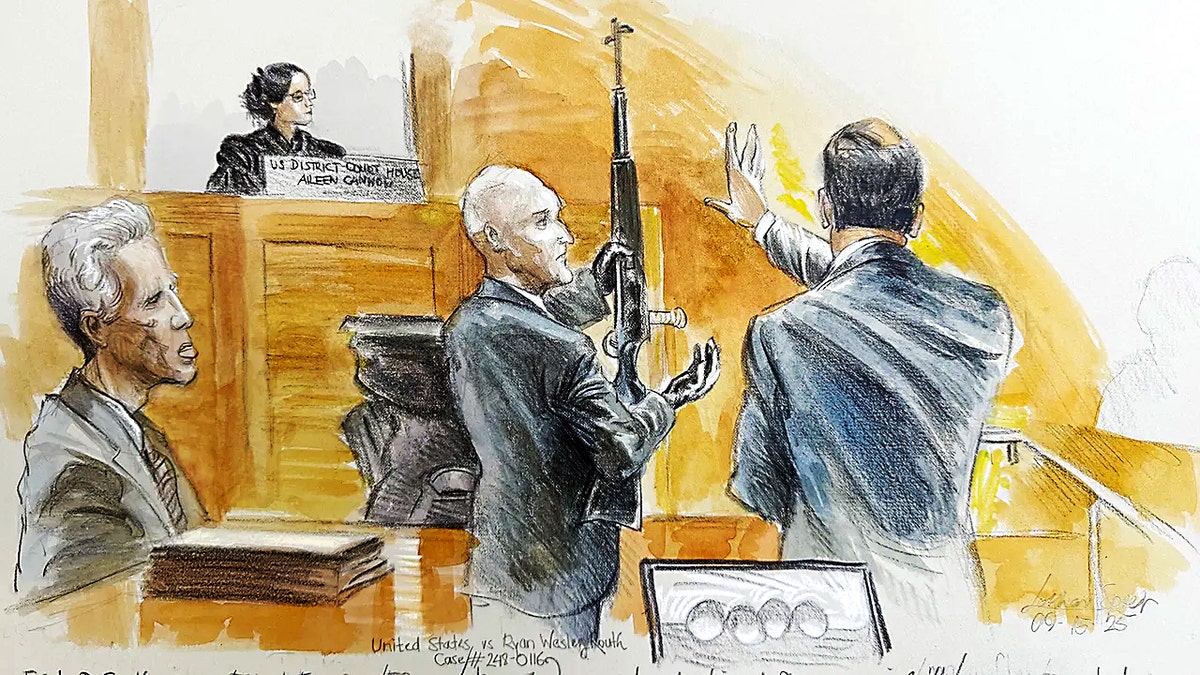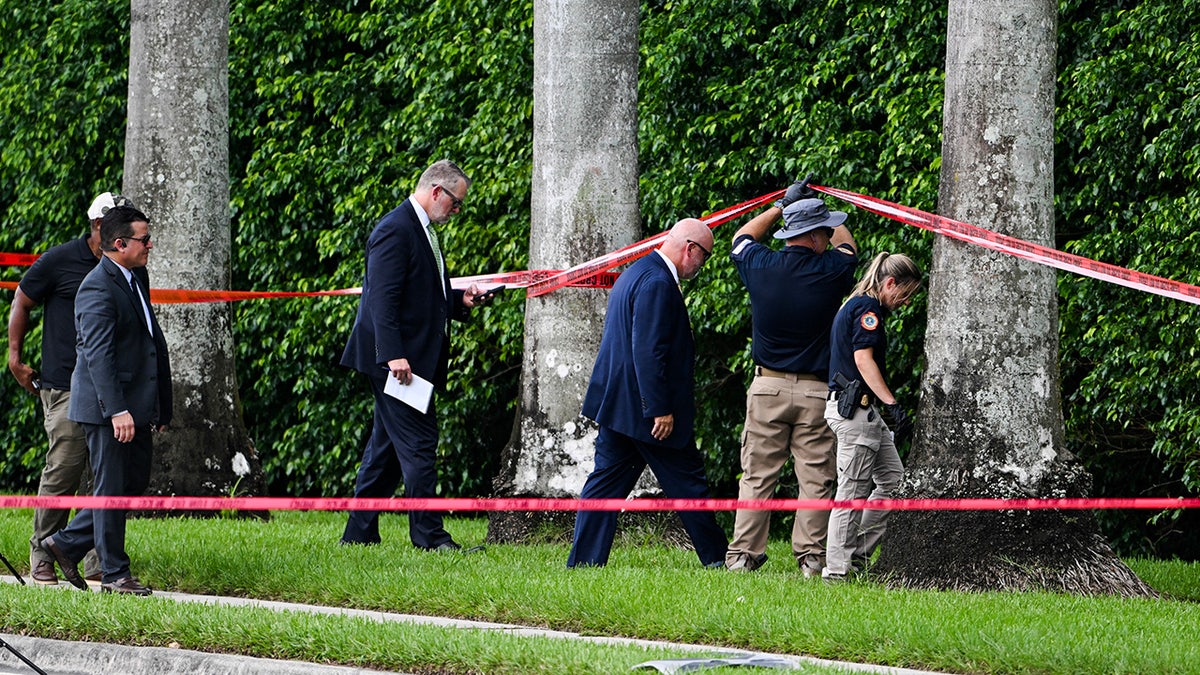NEWYou can now listen to Fox News articles!
Ryan Routh, the man accused of attempting to assassinate then-presidential candidate Donald Trump at his Florida golf course last year, said he would not take the stand in his own criminal case on Monday — the strongest sign yet that the defense is preparing to rest its case and kick the trial into its final phase before jury deliberation.
Routh, 59, has been representing himself in the federal criminal trial. He has pleaded not guilty to charges of attempting to assassinate a major presidential candidate, assaulting a federal officer, and possession of a firearm, among other crimes. If convicted, he could face life in prison.
He previously floated the possibility that he could testify on his own behalf — a risky strategy that would have waived his Fifth Amendment protections against self-incrimination, and opened him up to cross-examination by federal prosecutors.
U.S. District Judge Aileen Cannon asked Routh repeatedly Monday morning whether he’d had enough time to consider his decision not to testify, and whether he wanted to consult standby counsel. He said he was sure. Prosecutors then asked for the lunch hour to decide if they would call rebuttal witnesses.
If none are called, the defense is expected to rest within hours, clearing the way for closing arguments and jury deliberations.
TRUMP TRIAL CONTINUES WITH MORE FBI TESTIMONY AFTER RIFLE CALLED ‘PREPARED TO FIRE’

A sketch depicting court proceedings during the Ryan Routh trial in Fort Pierce, Florida on Sept. 15, 2025. Ryan Routh is accused of an attempted assassination on President Donald Trump at his West Palm Beach golf club in 2024. (Lothar Speer)
Routh opened his defense Monday with testimony from Michael McClay, a gun specialist and his only expert witness; followed by a family friend, Atwill Milsun, and a former colleague, Marshall Hinshaw.
McClay, an expert in sniper firearms and tactics with an extensive career in military and law enforcement, confirmed at the outset of Routh’s questioning that he was subpoenaed to testify, and did not want to appear on Routh’s behalf.
Routh spent most of the time questioning McClay about the operability scope of the rifle in question, including trying to cast doubt on the likelihood that the SKS rifle in question could not hit a target 375 yards away.
McClay said that it depended on the skill of the shooter — but confirmed that the rifle was capable of hitting a target from that distance.
During cross-examination, prosecutors asked McClay about whether the rifle could inflict damage to someone at that distance, which McClay confirmed it could.
Routh’s questions for McClay were buffeted by long pauses and sighs from Routh, who at one point, mused aloud: “I have to order my questions, or I will get confused.”
FBI PHONE EXTRACTIONS, DNA TESTIMONY HEADLINE DAY 7 OF RYAN ROUTH TRIAL



Law enforcement officials work at the crime scene outside the Trump International Golf Club in West Palm Beach, Florida on September 16, 2024, following Sunday’s attempted assassination on then-presidential candidate Donald Trump. (Chandan Khanna/AFP via Getty Images)
Routh’s witness list was sparse compared to the dozens of witnesses introduced by prosecutors, including forensics experts, FBI agents, and Secret Service agents over the course of a two-week period.
Instead, he used his two character witnesses to bolster his own attempts to cast himself as a person of “peacefulness, gentleness, and non-violence.”
Before his former colleague, Marshall Hinshaw, took the stand, Cannon reiterated to Routh the risks of introducing character witnesses, noting that personal relationships can leave such witnesses exposed to tough cross-examinations. Assistant U.S. Attorney John Shipley told Judge Cannon in response that they planned to limit such questions.
The bulk of the questions Routh asked his witnesses focused closely on his reputation and engagement within the community. “You were very well-liked,” Hinshaw told Routh, adding that he would “not expect” Routh to harm anyone.
Asked whether he could have run for city council, Hinshaw responded, “absolutely.”
Certain questions, including about Routh’s ex-wife, prompted Cannon to interject several times, noting that they were far beyond the scope of the case.
His family friend, Atwill Milsun, echoed that Routh is not a violent person. “You’ve always been a jolly person,” he told Routh, who he said offered “everything he had” to the local community.
Still, Routh’s absence of counsel was starkly on display. His questions prompted visible frustration from Cannon, who at times had to stop the proceedings and instruct the jury to disregard questions or statements from Routh.
At times, his questions veered into deeply unconventional territory, leaving Cannon seemingly at a loss for words.
At one point, Routh asked Milsun whether he had “ever met Tony Hawk.” Milsun responded, “yes,” though not because of Routh.
Routh then asked, “Would you be willing to go with me to Taiwan to host an international music festival?” prompting Cannon to cut Routh off from his questions completely.
“I’ve given you a great deal of latitude, [but] this must cease,” she told him.
On a cross-examination, prosecutors asked Milsun if he was aware that Routh ran over an employee with his truck. Milsun responded that he had not been aware of this.
Both witnesses acknowledged during cross-examinations they had not spoken to Routh for years.



A sketch depicting court proceedings during the Ryan Routh trial in Fort Pierce, Florida, on Sept. 18, 2025. Ryan Routh is accused of an attempted assassination on President Donald Trump at his West Palm Beach golf club in 2024. (Lothar Speer)
Routh was also not expected to present any evidence on his own behalf. He suggested, at one point, the idea that had a “new flashlight item” to submit, though it is unclear what, exactly, he was referring to.
Cannon told him that he would need to “lay a proper foundation” before submitting any evidence. Asked whether the flashlight had an exhibit number, Routh told her, “It’s a brand new item we just created.”
Cannon told him to defer the matter to standby counsel and return to questioning his witness.
His earlier submissions to the court were deemed to be inadmissible evidence. Prosecutors noted the exhibits in question include books that were authored by Routh, as well as handwritten drawings and Eagle Scout awards from his childhood. Cannon previously said she would keep the exhibits on the docket to give Routh the ability to challenge the court’s ruling, if he felt the need to do so.
Routh’s attempt to defend himself in his own criminal trial, using scant evidence and a thin list of witnesses, starkly contrasts with the prosecution, which spent nearly two weeks carefully and extemporaneously making its case against Routh to a jury in Fort Pierce, Florida.
In that span, jurors heard from 38 witnesses and reviewed hundreds of exhibits — text messages, call logs, bank records, and cellphone data — linking Routh to the alleged gun purchase and placing him near Trump International Golf Club in West Palm Beach in the weeks before the attempted assassination.
Prosecutors also presented extensive digital and forensic evidence. FBI officials testified last week that Routh’s DNA was found on the rifle scope grip, a glove, a bungee cord, and a bag recovered from the “sniper’s nest” near the sixth hole, where he allegedly waited at least 12 hours for the president’s arrival.
Before resting its case Friday, the government’s final witness, FBI Supervisory Special Agent Kimberly McGreevy, walked the jury through extensive cellphone data, license plate records, surveillance footage, and other information prosecutors alleged tied Routh to Trump’s movements in the weeks before the alleged attempt.
Cannon, despite her visible frustration, seemed to hope Routh would take the opportunity to testify on his own behalf.
“Have you had enough time to decide?” she pressed him at one point during the day.
CLICK HERE TO GET THE FOX NEWS APP
“A year,” Routh told her in response.
After the defense rests, both sides will present their closing arguments to the jury before they deliberate on the verdict. Closing arguments are expected Tuesday or Wednesday at the latest.




